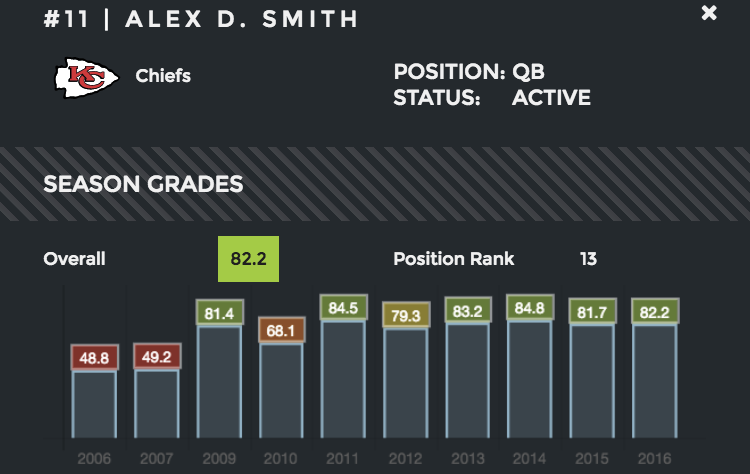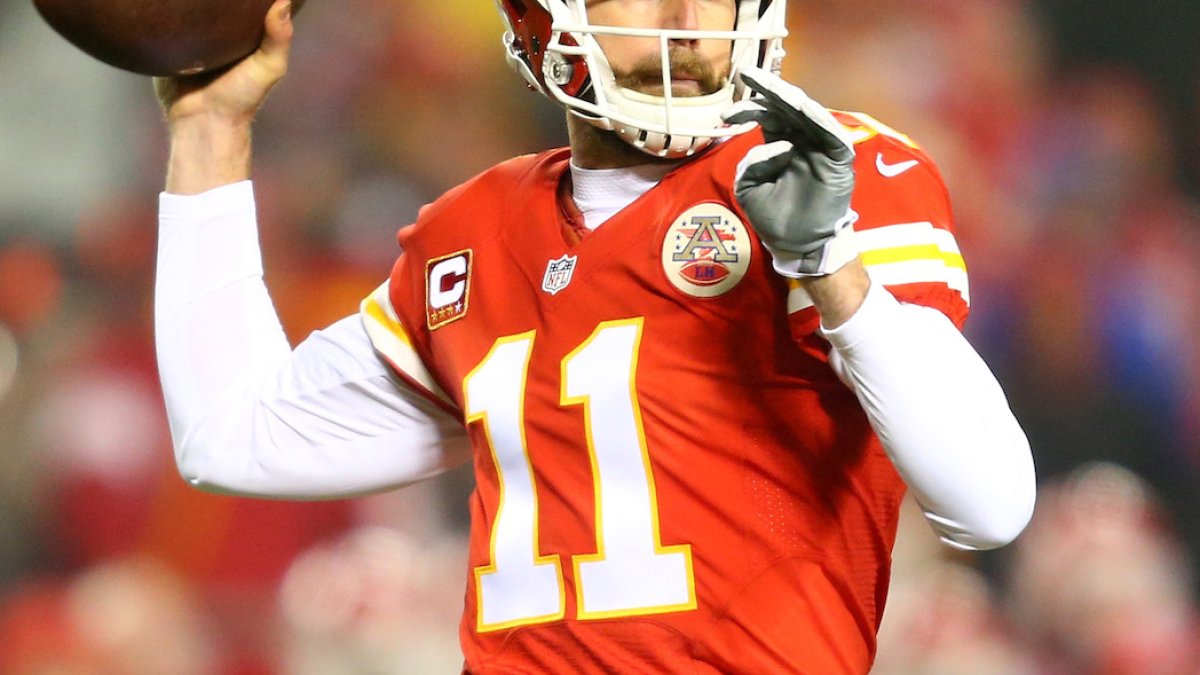The Chiefs’ season ended Sunday with a hard-fought home loss to a Steelers team that, in almost every way, outplayed them from the opening kick to the final kneel-down. While the team’s sixth home playoff loss in eight tries concluded the 2016 season in disappointing fashion, it was a remarkable campaign for Andy Reid’s club. After losing Sean Smith, Jeff Allen, Ben Grubbs, Husain Abdullah, Mike DeVito and Tyvon Branch in the offseason, Kansas City was forced to play much of the year without key starters Jamaal Charles, Justin Houston, Jeremy Maclin, Jaye Howard, Allen Bailey, Josh Mauga and Parker Ehinger—and still came away with a 12-4 record and their first division title since 2010.
While adversity has been a constant for the Chiefs under Reid, winning games has been as well. The Chiefs’ have compiled a 44-24 record (including playoffs) during his tenure, including three playoff berths (the Chiefs had only three playoff berths the previous 15 years combined). While defense and special teams have been Kansas City's calling card—with the defense ranking second, 12th, sixth, and 14th, and the special teams unit sixth, fifth, third and third in our grading since 2013—the competent play of quarterback Alex Smith has given credibility to an offense that ranked 31st and 32nd in the league in scoring the previous two years before he arrived, and had been the team’s Achilles' heel for most of the previous decade. With all of that said, the Chiefs are just 1-3 in the playoffs with Smith, and his limited, ultra-conservative style of play leaves people wondering whether or not he can help them win their first Super Bowl title since January 1970. Kansas City’s decision regarding the future of their quarterback position is multifaceted, with their tolerance of Smith’s deficiencies probably resting on a sliding scale correlated with how things pan out across the rest of their roster. In this piece, we discuss Smith’s future in relation to other key roster components for the Chiefs.
Kansas City's current backup quarterback situation
The Chiefs have one of the most precarious cap situations in the league. According to Over the Cap, they are projected to possess just $4.28 million of cap space this offseason, which is 30th in the league. One of Smith’s possible replacements, backup quarterback Nick Foles, is due a $10.75 million cap number for 2017, but all of that money can be used as cap savings if he is released before June 1. Foles will always be remembered for his outrageous statistical season in 2013, but since that time, he hasn’t been close to being a positively-graded player in PFF's system, and was one of the worst quarterbacks in the league when asked to guide a conservative St. Louis Rams offense in 2015. Given that Smith would count for almost $11 million in dead money over the next two years were he released this offseason, I don’t see a scenario in which the Chiefs keep Foles either as their starter or as a bridge to an up-and-coming player and jettison Smith.
Although Tyler Bray was able to beat out draft pick Aaron Murray for the third-string job this preseason, he has just 185 preseason snaps to his name, and is a long shot at best to every make a substantial contribution to the Chiefs’ offense.
Upcoming draft and free agency
The Chiefs hold the 27th pick in the 2017 NFL Draft, and are projected to gain about four compensatory picks to bring their total to 11 picks. Although there are teams with quarterback situations more dire than Kansas City’s, it’s not extremely unlikely that one or more players from the group, including Deshaun Watson (Clemson), DeShone Kizer (Notre Dame), Pat Mahomes (Texas Tech) and Mitch Trubisky (North Carolina), falls into a palatable spot for the Chiefs. In such a case, Kansas City could draft Smith’s successor with the intention of sitting him for a year. Pushing the starting quarterback decision to 2018—where Smith is due $20.6 million (versus $16.9 in 2017), of which only $3.6 would be dead if he were let go ($7.2 in 2017)—would give the Chiefs a more clear-cut path towards deciding the future of the position.
In an era where later-round QBs like Tom Brady, Russell Wilson and Dak Prescott are quarterbacking their teams deep into the playoffs, it may be tempting for Kansas City to consider using a late pick on a quarterback they hope to develop and compete for the starting spot in 2018, or possibly late in 2017. Numbers would not be on their side in this event, however, as only two (including Prescott) of the seven quarterbacks drafted between rounds two and five in the 2016 draft are even close to front-runners for their team’s starting spot in 2017, and only one of four such players from 2015 are in that position today. The Chiefs themselves have spent fifth-round picks in two of the last three drafts on quarterbacks, neither of whom is on Kansas City’s roster at the moment.
The lack of cap space available to the Chiefs will make the acquisition of someone like Tony Romo or Tyrod Taylor highly unlikely, and the pursuit of cheaper options like Mike Glennon (Tampa Bay), Matt Barkley (Chicago) or Landry Jones (Pittsburgh) comes with similar uncertainty as a high draft pick, but at a possibly higher monetary cost.
Chiefs' offensive supporting cast
Since Smith arrived in 2013, his supporting cast has evolved from a group consisting predominantly of running back Jamaal Charles (who accounted for 36.7 percent of Kansas City's total offensive yards, and 46.3 percent of their offensive touchdowns) to a group of pass catchers that includes tight end Travis Kelce (the second-highest graded receiving tight end in the league), Jeremy Maclin (2.16 yards per route run and only one drop in 2015) and Tyreek Hill (a team-high nine offensive touchdowns as a rookie in 2016). Despite this evolution, Smith has largely remained the same from both a process and productivity standpoint, averaging just 7.0, 6.0, 7.0 and 7.0 yards of depth per target and 6.7, 7.1, 7.2 and 7.0 yards per pass attempt in his four seasons in Kansas City. While the former numbers are near the bottom of the league, the latter have actually slightly risen up the quarterback ranks, speaking to how the Chiefs have better adapted their offense to suit Smith’s skills.
With Charles’ injury history and salary ($7 million, $0 dead money if let go), it’s unlikely that he’ll be around in his customary role. Spencer Ware is a capable starter, but was slowed by injuries towards the end of the 2016 season, and would benefit from a comparable complementary back. While depth is a long-term concern, the offensive line played much better in 2016 than it did in 2015, going from 23rd in the league in pass blocking efficiency to fourth, while staying in the middle of the pack as a run-blocking unit. With none of their key offensive players set to enter free agency, a 2017 offense that includes—and is built for—Alex Smith will have little in the way of unknowns, which can often help the process of making decisions on the other side of the ball.
Kansas City's defense
Long-time Chiefs defenders Eric Berry and Dontari Poe are set to hit free agency this offseason and, while Berry has continued to be a difference-maker on the back end, Poe has regressed substantially from his breakout 2013 season up front, with his run-stop percentage falling from 8.5 to 4.0 during that time. With Poe struggling and Howard and Bailey on IR, Kansas City’s run defense was struggling even before future Hall of Famer Derrick Johnson tore his Achilles for the second time in three seasons, and was dragged around by Le’Veon Bell to the tune of 170 yards (89 after contact) this past Sunday. The Chiefs’ front-seven is therefore sure to be an area of need this coming offseason, as they try to take their yards per carry allowed from the 4.4 this season back to something like the 4.1 they allowed in 2015. This need might require a high pick or a series of middle-round picks—selections that might otherwise be earmarked towards filling the quarterback-of-the-future position.
Re-signing Berry is an absolute must, as it is difficult to see the Chiefs elevating from the “good” defense that got them to the Divisional Round of the AFC Playoffs the last two years to the “elite” defense necessary to win a Super Bowl with Alex Smith at quarterback without Berry in the deep middle of the defense. It’s likely he’ll command something in the neighborhood of $10–13 million a year, which will sufficiently deplete the resources necessary to replace Smith with a big-name passer in 2017, further underscoring the difficulties the Chiefs face with this quarterback position as it pertains to this upcoming season.
Is Smith the best long-term option?
While Alex Smith surely leaves many underwhelmed with his play, the Chiefs' circumstances, and his consistency and durability, make keeping him as the starting quarterback going into the 2017 the soundest play. PFF's 13th-highest-graded quarterback has been remarkably steady during the course of his tenure in Kansas City, and that steadiness goes a long way towards making difficult decisions regarding how much to pay Eric Berry, what to do with Derrick Johnson and Jamaal Charles, and where to add depth defensively, at running back and on the offensive line.

Of the 47 quarterbacks with more than 500 passing snaps the last four years, Smith has just the second-most turnover-worthy throws. Elite play on the part of the Chiefs’ defense and special teams, coupled with the mistake-free football for which Smith and his supporting cast are capable, are enough to bring a Super Bowl title to Kansas City next season.
Be that as it may, elite play from defense and special teams is difficult to sustain. Additionally, as the Chiefs’ three drops and a fumble on Sunday would attest, supporting casts do not always sufficiently support their quarterback (Smith was the highest-graded player on the Kansas City offense Sunday). Smith most likely lacks the upside to overcome any deficiencies from the aforementioned parties, generating the eighth-fewest big-time throws since becoming the Chiefs’ quarterback, which makes the desire to move on from him both natural and reasonable. If the Chiefs are confident they can enhance their defense, running game and offensive line depth by using lower-round picks, using a high draft pick on an eventual successor and starting him out behind Smith on the depth chart come 2017 is probably Kansas City's best path towards eventually competing with New England and Pittsburgh, among other annual playoff contenders, for supremacy in the AFC.



 © 2024 PFF - all rights reserved.
© 2024 PFF - all rights reserved.